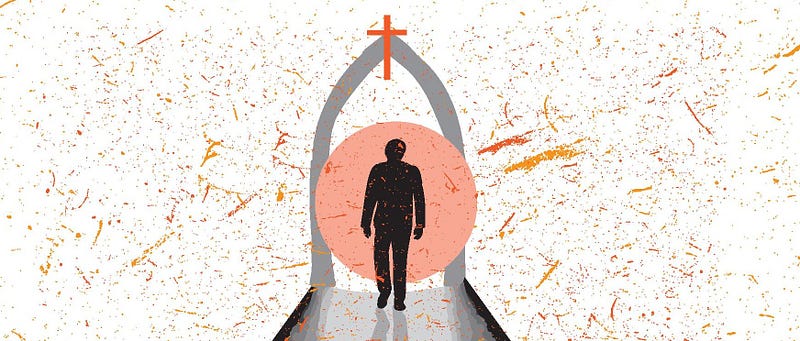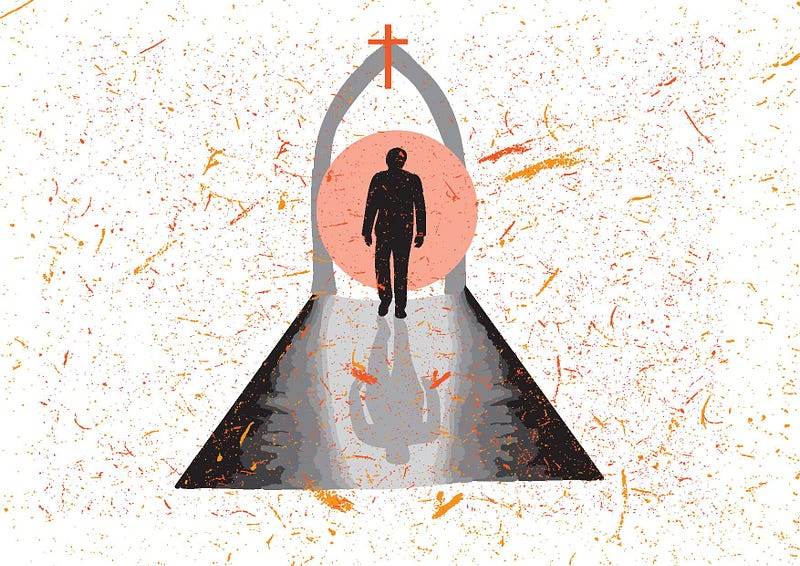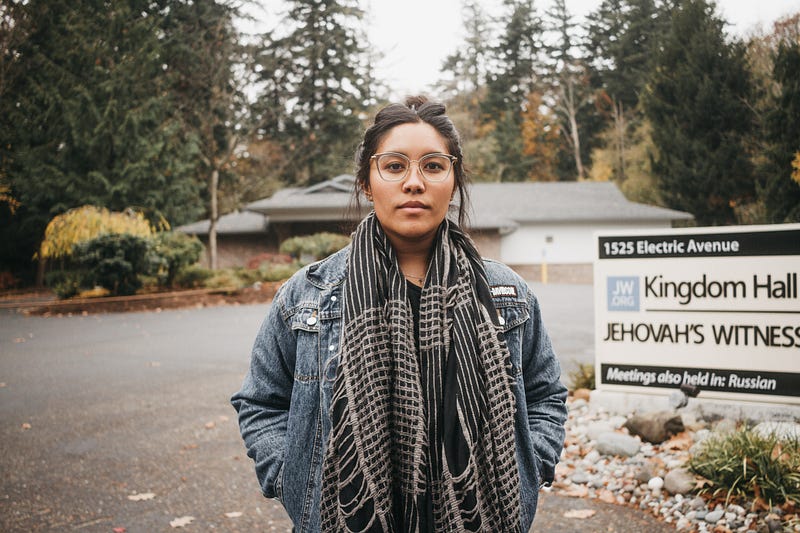Exiled on Sundays
Individuals who’ve left religious communities recount the trauma and shame of leaving behind family, friends and community
*Editor’s Note: The last names of certain sources have been omitted due to privacy concerns
By Sabrina Batingan

As a baby in their mother’s arms, Jenée had no idea the knock on their trailer door would be the beginning of a childhood they describe as full of shame, hiding and secrets.
Jenée’s mother had just returned from prison, vulnerable and open to any saving grace when Jehovah’s Witnesses came to their home. The promise of an everlasting life took hold of their mother’s future, ultimately leading to their conversion into the religion.
The Jehovah’s Witness religion is a small denomination of Christianity, making up only 0.8% of Christians, according to the Pew Research Center. Established in the late 19th century, Jehovah’s Witnesses are known for their ministry work. From knocking on doors to standing in public areas with books, many people recognize them for their acts of preaching door to door.
For Jehovah’s Witnesses like Jenée’s mother, joining the religion is no hassle at all but leaving, on the other hand, would cause large rifts among their friends and family who remained in the denomination.
According to rules set by Jehovah’s Witnesses, when an individual is baptized into the religion and then commits a serious sin and does not repent, they are then “disfellowshipped.” Disfellowshipping can be compared to shunning, an act of intentional dissociation from a social group or community. In most cases, the individual’s family and congregation members who remains in the religion must cut all ties with the individual who breaks these rules.
The World Headquarters of Jehovah’s Witnesses in Tuxedo Park, New York did not respond to my request for an interview.
These are the stories of four former congregants, including my own, who chose to leave their lives in religious sects, and have been disfellowshipped or excommunicated in result.
Jenée
Before the announcement of Jenée’s disfellowshipment was made, their brother visited to say a final goodbye. The next time he would speak to them would not be for years.
Jenée, 34, who goes by they/them pronouns, described what it felt like to be disfellowshipped at the age of 17. Congregant elders questioned and interrogated Jenée for making immoral choices, in accordance with their doctrine. The decision to disfellowship them caused Jenée to lose their entire support life-line: their family.
“I experienced a lot of trauma at the hands of Jehovah’s Witnesses,” Jenée said. Their eventual exit of the religion came when they posted a letter online telling their mom they identified as an apostate. Apostates are former Jehovah’s Witnesses who speak out against them and their practices.
Kathleen Brian, a global humanities and religion instructor at Western Washington University, noted that intentional excommunication of a member from their religious inner-circle can trigger long-term emotional trauma and shock for the person being ex-communicated or shunned.
“It’s a grieving process,” Kathleen said. “Even if it’s a separation that you’ve chosen, it’s a rupture in identity, relationships and support systems.”
Strict repercussions for those who leave this religion not only separate families, but leave the disfellowshipped person feeling isolated without the support system they initially were raised with.
Even now, Jenée’s mother has completely shunned them.
Kayleigh
Ferndale resident and former Jehovah’s Witness, Kayleigh, 32, always knew she was going to eventually leave her former faith in her early 20s, she said. For years, Kayleigh pretended to be observant of her faith so she would not experience losing the connection she built with her parents and two sisters.
While she wanted to leave, Kayleigh felt pressured by her mother to stay. “My mother was emotionally manipulative and abusive,” she said. “She let us know daily that she loved her God more than us and we would be as good as dead to her if we left the faith.”
Still, if she remained in the religion, there was one major element of her identity that kept her from living the way she wanted.
As a lesbian, Kayleigh did not feel welcomed by those she grew up around. If she were to come out to her community, she said she would have certainly been talked to by the elders, if not asked to leave. Homosexuality is viewed by the Jehovah’s Witness community as a sin, according to their site.
“I felt very guilty about the hurt I would cause [my family],” Kayleigh said.

Those who become disfellowshipped have a hard time finding their place in the world. Many members choose to stay even when they don’t want to, as to not hurt or be cut off from their family members.
Kayleigh didn’t have to say goodbye to all her family members. Her sister decided to leave with her. Kayleigh is thankful she has non-Jehovah’s Witness family members to support her departure from the religion. She was not going through this process completely alone.
Alexus
It was like any other Sunday. Alexus, a 20-year-old Western Washington University student, was attending church about a month after her mother divorced her father. Divorce isn’t common within the Mormon community, she said. In such a small community, her parents’ marital decision became the elephant in the room.
“I felt ashamed for so long,” Alexus said. “Most of my family is still LDS, including my dad, both sets of grandparents and my dad’s entire side of his family. I haven’t been open about what I think and feel. I’m terrified about not having their support.”
She was in a class with all the young women in her church, discussing the topic of marriage. Having learned about this topic more than 50 times, Alexus spaced out during this particular session.
With so much on her mind, discussing the topic of marriage was the last thing she wanted to do.
“They knew something was wrong and they took a lot of pity on me. I personally didn’t want any pity,” she said. “Divorce is pretty normal, although quite taboo in the LDS culture. I wanted some sort of normalcy in my life, and I just wasn’t getting it there.”
She felt out of place when her Sunday school teacher said that no one will experience divorce once they are married in a temple.
“I didn’t want to be somewhere that made me feel like a black sheep, made my thoughts feel unsafe and where they taught things that were untrue, as well as totally ignored the difficulty that is marriage, no matter where you get married,” Alexus said. “So I left. I got up without a word, and left.”
Alexus has not been shunned for leaving her community but said she feels judged by those who remain. Since many of them do not understand why anyone would choose to leave the church, a lot of judgment is placed on those who pick that path, she said.
Many of her old community members have reached out to her to say she should return because God loves her and she will be forgiven but they often won’t take no for an answer.
The Church of Jesus Christ of Latter-Day Saints, also known as the Mormon church, does not explicitly practice shunning but the fear of hurting family members stops many people from leaving.

Sabrina
Similarly to Alexus, I know the feeling of losing my community all too well. However, being judged by those who I grew up with was only a small consequence of what I personally dealt with.
I was born Catholic, but then converted into a Jehovah’s Witness when my mom had.
My childhood was not like most other children. I wasn’t able to celebrate my birthday, Christmas, Halloween, Fourth of July, Easter or any of the holidays for that matter.
My classmates looked at me weird when I left the room to sit in the hall when they celebrated someone’s birthday. Amidst my conversion, my mom drilled into my head that I needed to remain separate from the world.
‘Armageddon was coming, but we would be saved,’ my mom would tell my three younger siblings and I.
Armageddon: the time known by many Jehovah’s Witnesses as when the world will end, and wipe out all who don’t believe, and only those who call themselves Jehovah’s Witnesses will be saved. My mother told me it was when paradise came onto earth and I could have pet lions and elephants, a huge house and eternal life.
I waited each day for this to happen, yet nothing came. Nothing, aside from my junior year of high school.
When it came to applying to colleges, my mom and many others from my congregation told me I could not attend because it was pointless when paradise was just around the corner. They did not want me to be influenced by the world, and I decided that I needed to leave.
I packed my bag, squeezed my youngest sister goodbye and walked out — leaving behind the tear-stained floors.
Though I was not officially disfellowshipped due to not being baptized, I was excommunicated from my family and the friends I made all those years at the kingdom hall.
My dad welcomed me into his home with open arms when I had nowhere to go. On the car ride to my new home, I felt a weight lift off my shoulders. I didn’t have to pretend anymore. I could just be me.
As fast as the weight lifted, a dark cloud crept over me and stayed. My mom cut me off completely. She would not acknowledge me for five years. Due to that rift, I barely saw my three younger siblings. To this day, I feel a divide between my siblings and I.
Life after leaving
Growing up Christian, I knew that at the root of it all, love and acceptance were supposed to be life’s driving factors. Matthew 22:39 says “Thou shalt love thy neighbor as thyself.”
But, it became difficult to understand how this could be when acts such as disfellowshipping, excommunication and guilt outlast the love I was raised to give.
From Jenée’s shunning to Kayleigh’s decision to leave hand-in-hand with her sister, their stories resonate with my own; as people who’ve lost everything but gained internal freedom to be ourselves.
If you ever find yourself without the people you grew up with, Jenée says hope always exists in the form of new communities, friendships, or even just one person by your side.
“There are pockets of humanity everywhere, people who want to help.”
